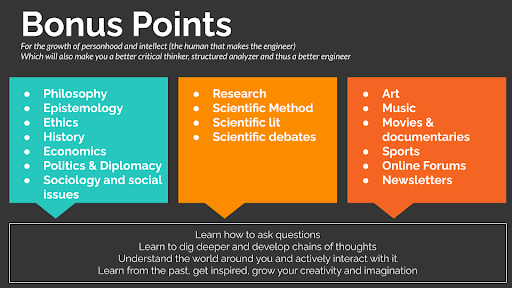While pursuing my degree in engineering, my classmates and I would have endless discussions about what makes a good engineer. We would compare engineering curricula, between engineering fields and engineering schools from around the world; we wanted to see what each implementation of engineering education thought about what makes great engineers.
At the end of those discussions, almost every time, we would complain about how much knowledge there is and how there isn’t enough time to know all of it. And then, perhaps to make ourselves feel better, we would immediately complain about our curricula and how our school isn’t doing enough to help us become equipped for the challenges of the “real world”.
After graduating, these types of discussions would resurface again and again (at work, at lunch breaks, at parties, at meetups.)
And similarly, they would end with complaints: Senior engineers complaining about the efficiency of junior engineers; And junior engineers complaining about the lack of mentorship and guidance.
During these discussions, we would manage to pinpoint what each of us thought were the skills missing or valued when discussing specific instances. However, the one thing we all agreed on, was that accurately formulating what makes great engineers is a really complex problem.
In this article, I try to round up some of the skills that would come up frequently in those discussions, as well as the lessons I learned and advice I received as a life-long student of engineering.
Stay Curious
When we think of curiosity, we tend to associate it with the desire to discover. Either you have it or you don’t !
Expanding this definition from desire to capability opens the mind to see curiosity as a malleable faculty; therefore developing it, continuously evolving it and embedding it in everyday actionable thinking.
Curiosity helps ask questions like “how does this work”, “why does it work this way”, “why is this needed”, etc. It also opens the appetite to research, knowledge, analytical, critical and intuitive thinking.
Ask Good Questions
Working as an engineer requires asking others for information. Yet, unlike other professions - like journalists, lawyers, investigators - who are taught to ask questions as part of their educational background or professional training, the majority of engineers - it seems - don’t actively think of asking questions as a worthwhile asset and a major advantage.
Harnessing the power of questioning can lead to uncovering valuable information, fast-pacing discussions, communications, effective and efficient brainstormings, and building trusted relationships in the workplace, among others.
Model Conceptually
A concept is a mental view of a problem, a system, or a process.
Before diving into the details, it can be helpful to visualise the underlying concepts or the conceptual model of certain problems, systems or processes in order to get an agreed-upon framework of understanding that can guide whatever endeavour the engineer (or -eers) will work on; Through this, conceptual models help build and develop more detailed quantitative models and solutions.
This can also support a shift from a linear thinking to a systems thinking, which leads to a better grasp of the (sometimes complex) key relationships between different elements that make up a system or its ontologies.
Conceptual models are also great brainstorming, research, study and communication tools; they could be used for developing hypotheses, creating simulations, expressing or explaining ideas, overviewing relationships between concepts, visualising or collaborating on ideations, designing solutions, or interpreting a system’s results.
Don’t Focus on Knowing The Names, Understand
The world of engineering is full of terminologies. Focusing on the terminology could confuse knowing the names with knowing the concepts - it could be the start of a damaging slippery-slope.
This illustrative quote from Feynman sums this up pertinently.

Get to The Basics - Problem Decomposition and Recomposition
Breaking down problems to smaller subproblems is a cognitive behaviour that is observed in many expert engineers. It’s a trait that captures the attention of many engineering educators as they try to come up with new ways of incorporating it in engineering education.
Getting to the root of concepts and understanding what they are and why they are what they came to be can look - at first - like an easily achievable enterprise; yet when confronted with complex systems, it can be challenging to apply.
Not All Problems Should Be Solved
“If I were given one hour to save the planet, I would spend 59 minutes defining the problem and one minute resolving it,” Albert Einstein.
Problems come in various shapes and forms, they require a diverse arsenal of approaches and methods to solve them. They also require a rigorous and intelligible understanding of the context they’re occurring in.
The key word here is gumption.
Learn by Doing and Experimenting
It’s not always easy to experiment and make mistakes in a world that expects things to get done rapidly. So choosing personal and professional projects (when possible) where one can experiment and practice can accelerate one’s learning curve and may even lead to serendipitous discoveries or learning.
“For the things we have to learn before we can do them, we learn by doing them,” Aristotle.
Grow The Human That Makes The Engineer

SOURCES & REFERENCES
[1] Engineering Design Thinking, Teaching, and Learning. Dym, Agogino, Eris, Frey, Leifer, 2005.
[2] Engineering Design Thinking - Journal of Technology Education Vol. 24 No. 2, Spring 2013
Citation
Please cite this article as :
NNZ. (Feb 2022). Lessons Learnt As a Life-Long Student Of Engineering. NonNeutralZero.https://www.nonneutralzero.com/blog/engineering-7/lessons-learnt-as-a-life-long-student-of-engineering-8/.
or
Lessons Learnt As a Life-Long Student Of Engineering